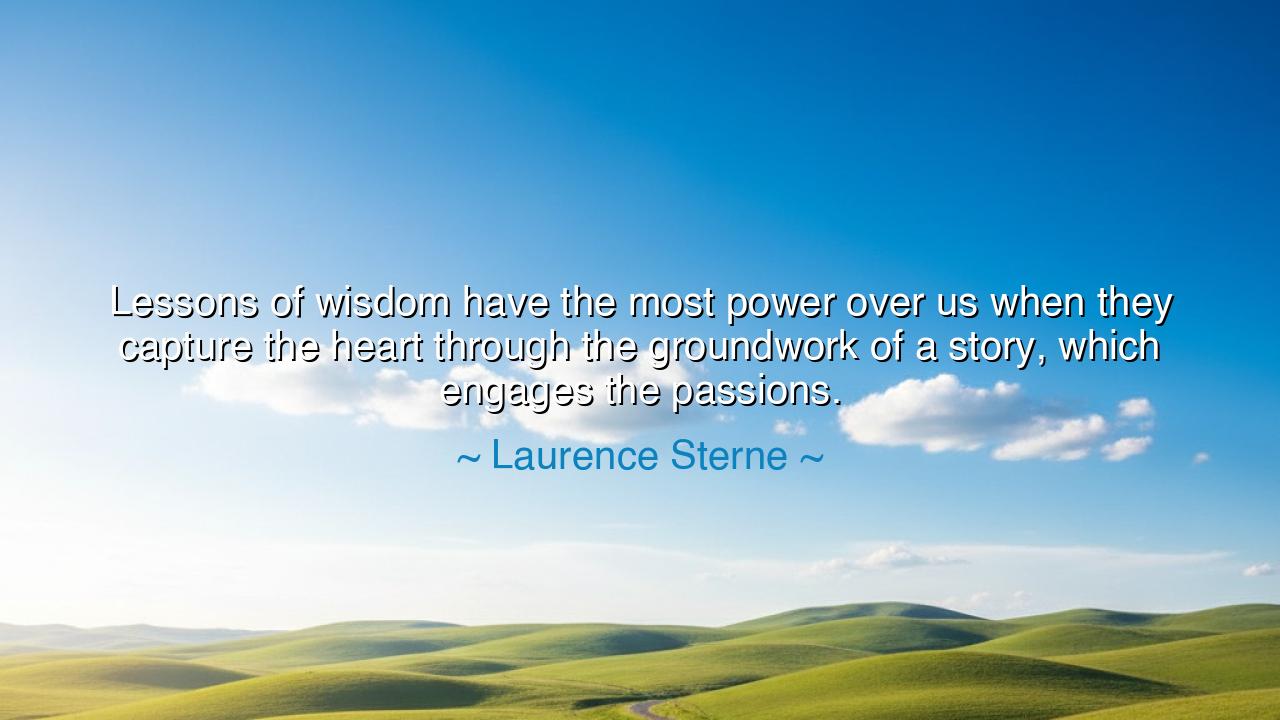
Lessons of wisdom have the most power over us when they capture
Lessons of wisdom have the most power over us when they capture the heart through the groundwork of a story, which engages the passions.






Laurence Sterne, in his profound understanding of the human spirit, declared: “Lessons of wisdom have the most power over us when they capture the heart through the groundwork of a story, which engages the passions.” In this observation, Sterne reveals the ancient truth that wisdom is not merely learned through cold facts or stern lectures, but through the deep, moving currents of storytelling. It is in the telling of a tale, in the weaving of characters and emotions, that the soul is most open to transformation. Story allows wisdom to flow not through the intellect alone, but through the heart, where it takes root and grows.
The meaning of this quote is timeless. When wisdom is delivered through story, it bypasses the barriers of the mind and strikes the core of our being. A tale told well stirs the passions, rouses the imagination, and binds us to the lessons within it. Stories create a bridge between the speaker and the listener, making abstract concepts tangible, turning them into lived experiences. Wisdom, when wrapped in the fabric of narrative, moves us not only to understand but to feel, to change, to act.
History, too, confirms this profound method of learning. Consider Aesop’s Fables, simple stories of animals that imparted profound truths about human nature and the world. Though brief, these tales have endured for millennia, not because they teach in a direct manner, but because they speak to the heart and evoke a response from the soul. The wisdom of these fables—the value of patience, humility, and honesty—resonates in every heart, not because it is dictated, but because it is felt through the experience of the characters’ trials.
Another example is the powerful teachings of Homer in the Iliad and the Odyssey. These epic tales, rich with valor, love, loss, and vengeance, embody the wisdom of the ancient world, yet they do so through the passions of their heroes. The stories of Achilles and Odysseus live not only in the lessons they teach but in the hearts of those who read them, who feel the same passions—grief, courage, rage—that the heroes themselves experienced. It is through this emotional connection that the wisdom of the ancients continues to shape the hearts and minds of modern generations.
Thus, the wisdom contained in stories, when it touches our hearts, is transformative. Storytelling is not merely entertainment but a method of learning, a means by which wisdom becomes alive, vibrant, and powerful. Sterne’s words remind us that it is not enough to impart knowledge—one must speak to the heart, engaging the passions of the listener, so that the lesson is not just heard, but felt and internalized. Wisdom becomes an active force in the world when it is shared through the timeless medium of story.






MNVo Nguyen Minh Nguyen
This quote makes me reflect on the psychological impact of stories in shaping values and judgment. If wisdom is best absorbed through narrative, it suggests that engagement and empathy play crucial roles in learning. I wonder whether this principle applies to historical education, self-help, or even corporate training. Could embedding lessons within stories make them more memorable and transformative, rather than relying solely on logical instruction or direct advice?
HALe Hai Anh
What strikes me is the idea that wisdom requires both intellectual and emotional engagement. Sterne seems to suggest that facts alone are insufficient; they need to be embodied in a story that resonates with the listener. I’m curious how this idea intersects with modern media, like films or podcasts, which often teach life lessons through compelling storytelling. Does this imply that narrative is an essential tool for influencing thought and behavior?
HN24 12B5 Hong Nhung
I find this statement insightful because it highlights the connection between emotion and learning. It raises questions about why humans respond so strongly to narratives. Could it be that the heart processes stories more naturally than abstract concepts? I’d like to explore whether this is why parables, literature, and even anecdotes are so effective in teaching moral or practical lessons. It seems engagement of the passions is key to true understanding.
QTQuang tran
This quote makes me think about the enduring power of storytelling. Laurence Sterne suggests that wisdom is most effectively conveyed when it appeals emotionally rather than just intellectually. I wonder how this principle applies in education or leadership—are lessons more impactful when framed as narratives rather than abstract rules? Perhaps stories work because they connect to human experience, allowing us to internalize values and ideas more deeply than mere statements ever could.